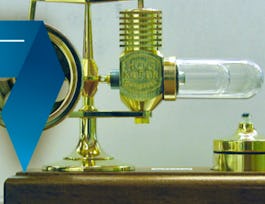This is an introductory course for students with limited background in chemistry; basic concepts involved in chemical reactions, stoichiometry, the periodic table, periodic trends, nomenclature, and chemical problem solving will be emphasized with the goal of preparing students for further study in chemistry as needed for many science, health, and policy professions.



Introduction to Chemistry: Reactions and Ratios

Instructor: Prof. Dorian A. Canelas
Sponsored by Mojatu Foundation
125,493 already enrolled
(1,262 reviews)
Details to know

Add to your LinkedIn profile
12 assignments
See how employees at top companies are mastering in-demand skills


Earn a career certificate
Add this credential to your LinkedIn profile, resume, or CV
Share it on social media and in your performance review

There are 7 modules in this course
Over the seven weeks of Introduction to Chemistry: Reactions and Ratios, you will be able to progress from a most basic knowledge of matter and energy to solving interesting real world chemical reaction stoichiometry problems. Each lesson in the course introduces some new concepts that allow you to build upon the material from previous lessons, so completing the coursework in the order that it is delivered will be most beneficial for developing a thorough understanding of synthesized information. This course is intended for students with very little background in the subject, but a strong foundation in algebra is needed to solve some of the problems.In the first unit, the course will first introduce the basic concepts of scientific methods and measurement. Then we will talk about matter, energy, and stoichiometry. Last, we prepared several lab demonstrations by Dr. Ken Lyle. I hope that you are as excited as I am to this amazing world of chemistry! Good luck!
What's included
12 videos2 readings2 assignments
<p>If you are interested in significant figures in more detail, here are some <a href="https://www.khanacademy.org/math/pre-algebra/decimals-pre-alg/sig-figs-pre-alg/v/significant-figures" target="_blank">good videos</a> to follow on Khan Academy.</p><p>This week we will continue our explorations of matter and energy. We will discuss the sub-atomic particles that govern chemical reactions, isotopes, anions, and cations. We will learn how to name compounds, calculate formula masses, convert between grams and moles, examine periodic trends, and more! An advanced problems set is posted now; that is a longer assignment and is optional unless you would like to be eligible for the Honor’s Track. You can still earn a regular verified certificate without completing the advanced problem sets, so please be sure to keep working on the normal weekly exercises.</p>
What's included
9 videos2 assignments
<p>In this week's videos and exercises (aka quizzes), we will learn how to name compounds, calculate formula masses, convert between grams and moles, examine periodic trends, and more!</p><p>I hope you enjoyed the last two weeks of learning chemistry. Great work on watching videos, posting on the discussion forum and submitting your exercises!</p>
What's included
7 videos1 assignment
<p>Week 4 for Introduction to Chemistry: Reactions and Ratios is about to begin! This week will be filled with introductions to chemical compositions, chemical reaction terminology, and reaction calculations.</p><p>If any of the following questions interest you, then watching this week's videos and doing some practice problems are probably a good way to get started! How much sodium is in my diet? What amount of pollutants are in drinking water? How much iron is in iron ore for steel production? These of the types of problems you will be able to address this week.</p>
What's included
7 videos2 assignments
<p>In the past five weeks of the course, we have learned concepts, rules, and skills, including but not limited to: the definitions of atoms, elements, molecules, and compounds; energy changes; Coulomb’s Law, molecular stoichiometry; atomic structures; periodic trends; the mole; compounds; atomic and molecular masses; molecular stoichiometry; balancing chemical equations.</p><p>In this coming week, we will be discussing aqueous solutions, solubility rules, precipitations and electrolytes! We are also going to learn the first type of chemical reaction equation in this course: Dissolutions.</p>
What's included
9 videos1 assignment
<p>We are almost at the end of our course! I hope this has been a rewarding experience for you because I know that the course is not an easy one and it is relatively long. So kudos to everyone who has made it this far!</p><p>Week 6 for Introduction to Chemistry: Reactions and Ratios will include very basic introductions to acid-base and redox reactions. We will also practice combining what we know from previous weeks to complete reaction calculations.</p>
What's included
6 videos2 assignments
Congratulations on making through to the final week of the course! It was not an easy journey for the past six weeks with dozens of videos, exercises, problem sets, and forum discussions. Kudos to the many of you who completed the honors lessons on top of the other work. I am proud of all of you!
What's included
2 assignments
Instructor

Offered by
Why people choose Coursera for their career




Learner reviews
1,262 reviews
- 5 stars
83.13%
- 4 stars
12.19%
- 3 stars
1.74%
- 2 stars
1.02%
- 1 star
1.90%
Showing 3 of 1262
Reviewed on Aug 13, 2021
I did not like chemistry because I had failed my previous chemistry 114 class in college. Taking this course have help me to understand the basics of chemistry. I'm grateful.
Reviewed on May 7, 2020
great course, it gives me more knowledge in chemistry and also can maintain my previous knowledge in chemistry. I truly like the explanation in atomic interaction part.
Reviewed on Jun 9, 2024
The course is great for refreshing and systematizing the key concepts from high school chemistry. Prof. Canelas was very engaging, and overall, it was just a very pleasant experience.
Recommended if you're interested in Physical Science and Engineering

Dartmouth College
École Polytechnique Fédérale de Lausanne

Birla Institute of Technology & Science, Pilani

Open new doors with Coursera Plus
Unlimited access to 10,000+ world-class courses, hands-on projects, and job-ready certificate programs - all included in your subscription
Advance your career with an online degree
Earn a degree from world-class universities - 100% online
Join over 3,400 global companies that choose Coursera for Business
Upskill your employees to excel in the digital economy




